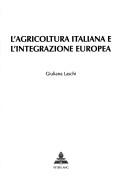| Listing 1 - 5 of 5 |
Sort by
|

ISBN: 3906762378 Year: 1999 Publisher: Bern : Lang,
Abstract | Keywords | Export | Availability | Bookmark
 Loading...
Loading...Choose an application
- Reference Manager
- EndNote
- RefWorks (Direct export to RefWorks)
Agriculture --- Agriculture and state --- Politique agricole --- Economic aspects --- Aspect économique --- Europe --- Economic integration --- Intégration économique
Book
ISBN: 3035296499 3035264074 Year: 2014 Publisher: Brussels, Belgium : P.I.E. Peter Lang,
Abstract | Keywords | Export | Availability | Bookmark
 Loading...
Loading...Choose an application
- Reference Manager
- EndNote
- RefWorks (Direct export to RefWorks)
The European Community (EC) has taken on an outward-looking dimension over the years since its first establishment, developing structures and tools which are unprecedented in the history of international relations. The original signatories of the Treaty of Rome accepted the idea of a little Europe only as a first step towards something that would be much bigger and more powerful; ultimately, they wanted to provide the EC with the international power necessary to realize the idea of the common market. It is not possible to properly define the EC's actions towards the rest of the world as foreign
European Union --- History. --- common market --- Communities --- Community --- European --- Giuliana --- Historical --- international relations --- Laschi --- Perspective --- power
Book
ISBN: 9782875741356 2875741357 Year: 2014 Volume: 81 Publisher: Bruxelles Bern Berlin [etc.] P.I.E. Peter Lang
Abstract | Keywords | Export | Availability | Bookmark
 Loading...
Loading...Choose an application
- Reference Manager
- EndNote
- RefWorks (Direct export to RefWorks)
The European Community (EC) has taken on an outward-looking dimension over the years since its first establishment, developing structures and tools which are unprecedented in the history of international relations. The original signatories of the Treaty of Rome accepted the idea of a ±little¿ Europe only as a first step towards something that would be much bigger and more powerful; ultimately, they wanted to provide the EC with the international power necessary to realize the idea of the common market. It is not possible to properly define the EC's actions towards the rest of the world as ±foreign policy¿ in every case and at every stage of its history; nevertheless, the EC has undoubtedly always played a strong and significant international role, even if this role has been expressed in an unconventional way compared to the international system. This volume on European spaces and borders provides a meeting-point for a number of very different analyses and interpretations, from a variety of disciplinary, chronological and geopolitical perspectives, and in so doing develops a rich and complex debate --
Union européenne --- Histoire --- Europe --- Pays de l'Union européenne --- Relations extérieures --- European Union --- EU --- Evropské unie --- Europäische Union --- Euroopa Liit --- EL --- Unión Europea --- UE --- Union européenne --- Unione europea --- Eiropas Savienības --- Europos Sajunga --- Európai Unió --- Unjoni Ewropea --- Europese Unie --- Evropeĭski sŭi︠u︡z --- Европейски съюз --- Evrosŭi︠u︡z --- Евросъюз --- Unia Europejska --- União Europeia --- Európska únia --- Evropska unija --- I︠E︡vropeĭsʹkyĭ soi︠u︡z --- I︠E︡vrosoi︠u︡z --- Euroopan unioni --- Europeiska unionen --- Aontas Eorpach --- Ittiḥād al-Ūrūbbī --- Liên minh châu Âu --- 欧洲联盟 --- Avropa İttifaqı --- Evrópusambandið --- Ittiḥādīyah-i Urūpā --- اتحاديه اروپا --- Yekîtiya Ewropayê --- Eurōpaikē Henōsē --- E.E. (Organization) --- EE --- Avrupa Birliği --- AB --- Europeiske union --- Sahabhāb ʻAȳrʺup --- History. --- EU (European Union) --- EL (European Union) --- UE (European Union) --- Liên minh Châu Âu --- E.E. (European Union) --- EE (European Union) --- AB (European Union) --- E.U. --- History --- Foreign relations --- European Union countries --- European Economic Community countries --- Relations extérieures. --- Histoire. --- Relations extérieures
Multi
ISBN: 9780429269011 9780367219550 Year: 2020 Publisher: London New York Routledge
Abstract | Keywords | Export | Availability | Bookmark
 Loading...
Loading...Choose an application
- Reference Manager
- EndNote
- RefWorks (Direct export to RefWorks)
This monograph addresses mobility and migrations as contributing phenomena in shaping contemporary Europe after 1945, in connection with decolonisation and the creation of the European Community. The disappearing of the colonial empires caused a large movement of people (former colonizers as well as formerly colonized people) from the extra-European countries to the "Old continent"; while the European integration project encouraged the movement of the citizens within the Community. The book retraces how, in both cases, migrations and mobility impacted the way national communities, as well as the European one, have been defining themselves and their real and imaginary boundaries.
Migration. Refugees --- Colonisation. Decolonisation --- anno 1900-1999 --- Europe
Book
ISBN: 2875744275 9782875744272 2875746324 2875746332 Year: 2023 Publisher: Brussels : P.I.E. - Peter Lang SA Éditions Scientifiques Internationales,
Abstract | Keywords | Export | Availability | Bookmark
 Loading...
Loading...Choose an application
- Reference Manager
- EndNote
- RefWorks (Direct export to RefWorks)
The book analyses diplomacy and paradiplomacy in the European Union and in Latin America from a multidisciplinary perspective. The paradiplomacy, as a means of unofficial relationships that reacts differently to the pressure of the international system, despite its relevance and importance, is scarcely analysed by academia.
| Listing 1 - 5 of 5 |
Sort by
|

 Search
Search Feedback
Feedback About UniCat
About UniCat  Help
Help News
News